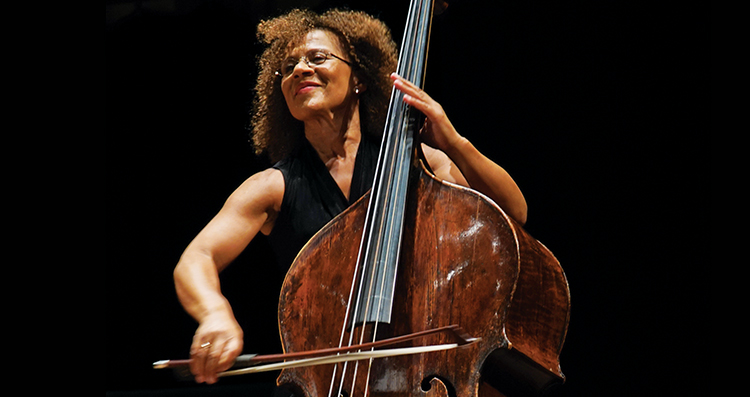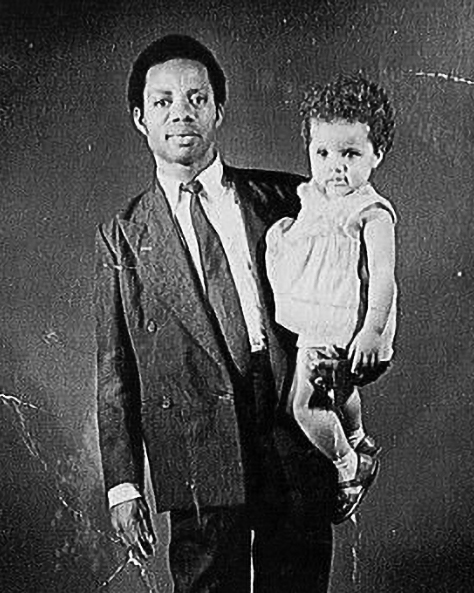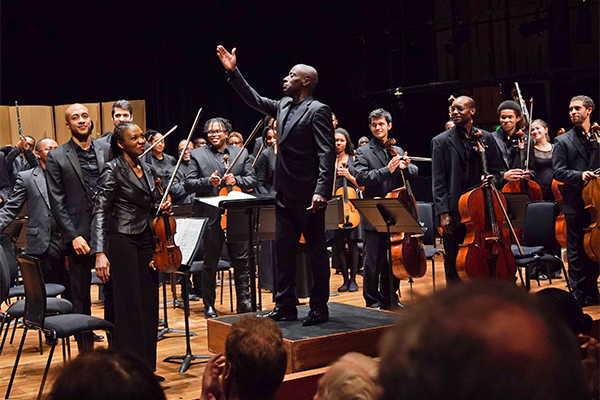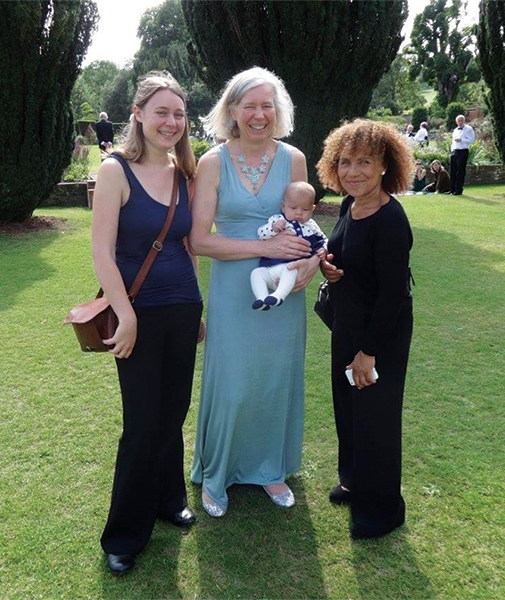Chi-chi Nwanoku OBE. Photo by Eric Richmond.
This article is drawn from the second issue of Tafel: our magazine for the musically curious. Offered three times a year, this publication will, we hope, welcome new friends as well as extend the rich conversations we are already having with so many of you. Read the entire second issue here.
In Conversation: Pippa Macmillan and Chi-chi Nwanoku
Chi-chi Nwanoku is a towering figure on the international music scene. The London, UK-based double bass principal, chamber, and solo musician is also professor of historical double bass at the Royal Academy of Music. Born in London of Nigerian/Irish heritage, she founded Chineke! Orchestra with the mission of championing change and celebrating diversity in classical music.
Chi-chi was awarded the Order of the British Empire for Services to Music in 2017. She won Black British Business Awards Person of the Year 2016, Association of British Orchestras Award 2017, and Commonwealth Cultural Enterprise Award 2018. She broadcasts regularly for BBC radio and television, and recently presented a Sky Arts documentary about Samuel Coleridge-Taylor. Chi-chi was the subject of Tales from the Bass Line, a documentary by Barrie Gavin, and contributed to the 2020 BBC documentary Being Beethoven.
Tafelmusik’s principal double bassist, Pippa Macmillan, considers Chi-chi Nwanoku to be her greatest inspiration. As Pippa’s first historical bass teacher, Chi-chi introduced her to historically informed performance practice and taught her to shape bass lines in a way that brings them to life.
Pippa Macmillan: How did music first enter your life?
Chi-chi Nwanoku: It was one of those incredible, stark nights; my father was carrying me in his arms and we were standing on the balcony looking out into the night. I was mesmerized and fascinated by the brilliance and abundance of the multitude of sparkling objects in the black sky. That was when Dad told me they were called stars. He proceeded to sing “Twinkle, Twinkle, Little Star” to me. To this day I still consider that to be my first music lesson.
Chi-chi Nwanoku and her father.
PM: When did you decide to become a professional double bassist, and how did you find your way into historical performance?
CN: I played recorder and piano from a young age. It was a passionate hobby, but I was seriously preparing to become a professional sprinter. When I was 17 and a half years old, I sustained a career-ending knee injury, and my dreams were over. My school music teacher guided me towards the double bass, as he thought I had a chance of a music career playing, in his words, “an unpopular instrument”! After graduating from the Royal Academy of Music and a further two years’ study with Franco Petracchi in Rome, the quirky and wonderful Francis Baines gave me a few baroque bass lessons.
PM: How do you view your work as a mentor and teacher, and how have your own role models shaped the way you relate to young musicians?
CN: You cannot underestimate the power of a role model. I take this very seriously and try to be open and honest with my students, encouraging them to be as authentic, passionate, and literal as possible in their approach. Never do anything half-heartedly! The three people who liberated me as a bassist were Petracchi, Ray Koster (Academy of St Martin in the Fields principal bass), and Francis Baines.
“If the creative arts industry is to survive in today’s climate, it has to be relevant to everyone in today’s community.”
PM: What inspired you to establish Chineke! Orchestra, Europe’s first majority Black, Asian, and ethnically diverse orchestra?
CN: After a 35-year career in classical music, the culture minister asked me why I was “the only Black musician” he ever saw in the orchestra on the international concert platform. My “light bulb” moment happened at the Kinshasa Symphony Orchestra’s concert at Royal Festival Hall. Everyone agreed something needed to be done, because if the creative arts industry is to survive in today’s climate, it has to be relevant to everyone in today’s community.
Chineke! Orchestra; Wayne Marshall, conductor.
PM: How can orchestras become better champions for diversity, equality, and inclusion?
CN: Be more open and curious; deliberately go out of your way to forge connections and collaborations with people who are not necessarily “like” yourselves, because creativity and new discoveries are fed by disparate things and points of view, sparking connections and enriching the whole process.
Actively choosing to invite people from different backgrounds is beneficial to your artistic process, and enhances diversity on a societal level. It takes a certain generosity to invite people to collaborate, and musicians need to cultivate this open-mindedness soon, otherwise they risk missing out on wonderful opportunities and stagnating in the same old way of doing things.
Whilst it’s important to ask questions about racism and how to combat it, first educate yourself so that your questions are informed. Very often, people lazily think by asking Black, Asian, and ethnically diverse people questions, they don’t need to do their own research or educate themselves. It can be draining for a Black, Asian, or ethnically diverse person to have to engage in multiple conversations about racism and to have to educate people about it, when many questions can be answered simply by reading books, watching documentaries, and listening to podcasts.
Engaging in conversation is important (I am by no means discouraging this), but spending time educating yourself is equally important and ensures your conversations are worthwhile and progressive. Ensure the entire orchestra wants the same diversity, inclusion, and belonging; diversify the orchestra’s board and management, as well as repertoire. Ensure the culture within your organization wants and is prepared for a more inclusive level of membership.
PM: Can you name some neglected composers whose works should be heard by a much wider audience?
CN: Esteban Salas, Jose Mauricio Nunes Garcia, Joseph Boulogne (Chevalier de Saint-Georges), Ignatius Sancho, Chiquita Gonzalez, Florence B. Price, Margaret Bonds, Samuel Coleridge-Taylor, Avril Coleridge-Taylor, William Dawson, and William Grant Still, to name a few.
Pippa Macmillan, Jenny Macmillan, Lyra Albrecht, and Chi-chi Nwanoku. Photo taken by Sebastian Macmillan at Glyndebourne Opera.
Watch a conversation between double bassists Chi-chi Nwanoku, OBE, and our own Pippa Macmillan below.
More articles from Issue No. 2: Winter 2021
In Paradisum: Rambling in Mary's Garden
Variations on Bach’s Goldberg Variations




